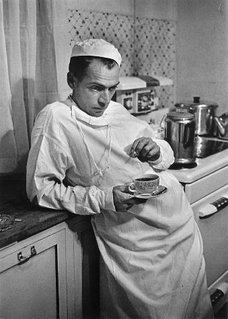Saturday, November 25, 2006
Why My Internship Isn't a Waste

X-posted from a comment to Dinosaur's post Ancillary My Ass:
I agree with a thorough assessment before ordering any testing besides vital signs. Some points to consider with respect to testing, from the meagre experience of a lowly intern.
1. You can't make an asymptomatic patient feel better. Exception: screening--http://www.ahrq.gov/clinic/pocketgd.htm
2. In general, clinical suspicion comes before biochemistry comes before radiology comes before pathology. Example: 21 y.o. F, no PMHx, /c F/C & anorexia x 1d, 5x NBNB N/V, RLQ pain, Pelvic/guiac (-)-->Bl Cx, UCx, U/A, Chem7, LFT, GC/Chlam, RPR, PT/PTT, T&C-->EKG, CXR, XR Upright & Decubitus/Supine, CT Abdo /c IV/PO contrast, (+/-) RUQ U/S, (+/-) Pelvic U/S-->OR for tx and final pathologic dx.
3. Don't do a test unless it is going to change your management; alternatively, don't do a procedure unless you can manage the complications. Ex: Only use sedation if advanced airway management is readily available.
4. Incidentalomas are a bad thing. The more testing ordered, the greater the probability of discovering an abnormality that, once documented, must be investigated, however irrelevant to the current clinical problem. Many legal ramifications--ex: lung nodules, liver/kidney/ovarian cysts, slight anemia/hypertension/hyperglycemia/LFT abnormalities.
5. Poor communication/ history taking/ rushed sign out/ lack of PMD involvement leads to needless reinvestigation of stable chronic problems. Very common in patients with diminished capacity/ inability to communicate/ foreign-language speaking only/ lack of social support/ or with poor compliance.
Overall, for common conditions, tests should be ordered mainly to confirm clinical assessment, to rule out rare or atypical presentations, and (unfortunately) to keep the sodomites at the door.

X-posted from a comment to Dinosaur's post Ancillary My Ass:
I agree with a thorough assessment before ordering any testing besides vital signs. Some points to consider with respect to testing, from the meagre experience of a lowly intern.
1. You can't make an asymptomatic patient feel better. Exception: screening--http://www.ahrq.gov/clinic/pocketgd.htm
2. In general, clinical suspicion comes before biochemistry comes before radiology comes before pathology. Example: 21 y.o. F, no PMHx, /c F/C & anorexia x 1d, 5x NBNB N/V, RLQ pain, Pelvic/guiac (-)-->Bl Cx, UCx, U/A, Chem7, LFT, GC/Chlam, RPR, PT/PTT, T&C-->EKG, CXR, XR Upright & Decubitus/Supine, CT Abdo /c IV/PO contrast, (+/-) RUQ U/S, (+/-) Pelvic U/S-->OR for tx and final pathologic dx.
3. Don't do a test unless it is going to change your management; alternatively, don't do a procedure unless you can manage the complications. Ex: Only use sedation if advanced airway management is readily available.
4. Incidentalomas are a bad thing. The more testing ordered, the greater the probability of discovering an abnormality that, once documented, must be investigated, however irrelevant to the current clinical problem. Many legal ramifications--ex: lung nodules, liver/kidney/ovarian cysts, slight anemia/hypertension/hyperglycemia/LFT abnormalities.
5. Poor communication/ history taking/ rushed sign out/ lack of PMD involvement leads to needless reinvestigation of stable chronic problems. Very common in patients with diminished capacity/ inability to communicate/ foreign-language speaking only/ lack of social support/ or with poor compliance.
Overall, for common conditions, tests should be ordered mainly to confirm clinical assessment, to rule out rare or atypical presentations, and (unfortunately) to keep the sodomites at the door.
Comments:
<< Home
4. Incidentalomas are a bad thing. The more testing ordered, the greater the probability of discovering an abnormality that, once documented, must be investigated, however irrelevant to the current clinical problem. Many legal ramifications--ex: lung nodules, liver/kidney/ovarian cysts, slight anemia/hypertension/hyperglycemia/LFT abnormalities.
WTH? Yes, we certainly wouldn't want to give the patient a head's up on lun cancer, iron deficiency (ulcers, bleeding in the colon), hbp, diabetes, etc.. What a neverending can of worms that would be. Jeez, just get out my office already!
*sigh*
WTH? Yes, we certainly wouldn't want to give the patient a head's up on lun cancer, iron deficiency (ulcers, bleeding in the colon), hbp, diabetes, etc.. What a neverending can of worms that would be. Jeez, just get out my office already!
*sigh*
Lisa: You'd be amazed how seldom you find something significant on testing that is truly asymptomatic. This comment is right on, despite the fact that you find it counterintuitive.
Post a Comment
<< Home
